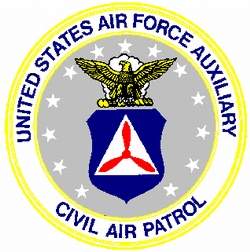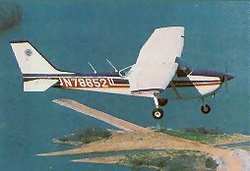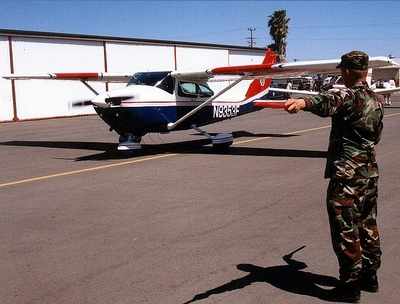 May 12 to 16, Civil Air Patrol volunteers
supported counterterrorism exercise TOPOFF 2 in Chicago and
Seattle. The Department of Homeland Security and Department of
State, in cooperation with federal, state, local and Canadian
partners, sponsored the five-day, full-scale exercise and
simulation of how the nation would respond in the event of a
weapons of mass destruction attack. CAP members in the two cities
worked closely with local agencies to do their part in the
emergency simulations.
May 12 to 16, Civil Air Patrol volunteers
supported counterterrorism exercise TOPOFF 2 in Chicago and
Seattle. The Department of Homeland Security and Department of
State, in cooperation with federal, state, local and Canadian
partners, sponsored the five-day, full-scale exercise and
simulation of how the nation would respond in the event of a
weapons of mass destruction attack. CAP members in the two cities
worked closely with local agencies to do their part in the
emergency simulations.
In Chicago, while some of the 30 participating Illinois members
role-played as victims, others stood ready to fly biohazard
technicians to the exercise site. Still more escorted dignitaries
and helped Chicago police with crowd control. CAP members there
also served as part of a large group sent to selected hospitals and
public health facilities to receive simulated inoculations against
the exercise “plague” virus. This demonstrated the
city’s capacity to obtain and distribute mass
medications.
In Seattle, seven Washington Wing CAP cadets and senior members
role-played as victims for medical triage and treatment. Afterward,
they critiqued the treatment they received for exercise officials.
Two additional CAP officers served as expert data collectors for
the Seattle Fire Department extraction team and the emergency
medical services triage team. They documented all pertinent data on
the exercise during their assigned shifts for later analysis by
exercise leaders.
 “As a result of work by the Illinois and
Washington wings, the TOPOFF 2 planners now understand even better
what CAP has to contribute -- both in real-world scenarios and in
such exercises as TOPOFF,” said John Kittle, CAP chief of
counter-drug and homeland security. “This exercise was
valuable in helping local emergency agencies become more familiar
with CAP’s capabilities and personnel.”
“As a result of work by the Illinois and
Washington wings, the TOPOFF 2 planners now understand even better
what CAP has to contribute -- both in real-world scenarios and in
such exercises as TOPOFF,” said John Kittle, CAP chief of
counter-drug and homeland security. “This exercise was
valuable in helping local emergency agencies become more familiar
with CAP’s capabilities and personnel.”
Col. Doug Jones, CAP Washington Wing command liaison for
homeland security and counterdrug operations, attended the
debriefing for the Seattle venue. “Awareness of Civil Air
Patrol's homeland security capability has increased considerably as
a result of our involvement in TOPOFF 2,” Jones said.
“Federal, state and local officials now have a much better
understanding of how Civil Air Patrol can support the national
homeland security strategy."
The first TOPOFF exercise was held in May 2000 in Denver and
Portsmouth, N.H. That exercise included simulations of both
chemical and biological terrorist attacks. “The TOPOFF
exercises are an important part of our national preparedness
strategy,” said Tom Ridge, homeland security secretary.
“If we are going to make our response system stronger, we
first have to identify where strengths and weaknesses exist. That
is what TOPOFF is designed to do.
“These challenging scenarios forced us to gauge our
readiness, test our internal communications and reinforce
relationships. As with the first TOPOFF exercise, held three years
ago, we hope TOPOFF 2 will provide us with concrete examples of how
we can better respond to attacks. While we're doing everything we
can to prevent, deter and disrupt terrorist activity, we have to be
prepared to respond to any real-life scenario that might
occur.”

Civil Air Patrol, the official Air Force auxiliary, is a
nonprofit organization with more than 64,000 members nationwide. It
performs 95 percent of continental U.S. inland search and rescue
missions as tasked by the Air Force Rescue Coordination Center.
Volunteers also perform homeland security, disaster relief and
counterdrug missions at the request of federal, state and local
agencies.
 ANN's Daily Aero-Term (04.26.24): DETRESFA (Distress Phrase)
ANN's Daily Aero-Term (04.26.24): DETRESFA (Distress Phrase) ANN's Daily Aero-Linx (04.26.24)
ANN's Daily Aero-Linx (04.26.24) Airborne 04.22.24: Rotor X Worsens, Airport Fees 4 FNB?, USMC Drone Pilot
Airborne 04.22.24: Rotor X Worsens, Airport Fees 4 FNB?, USMC Drone Pilot Airborne 04.24.24: INTEGRAL E, Elixir USA, M700 RVSM
Airborne 04.24.24: INTEGRAL E, Elixir USA, M700 RVSM Airborne-NextGen 04.23.24: UAVOS UVH 170, magni650 Engine, World eVTOL Directory
Airborne-NextGen 04.23.24: UAVOS UVH 170, magni650 Engine, World eVTOL Directory





